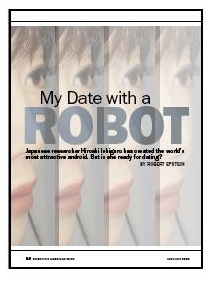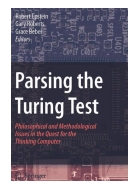|
MENTAL HEALTH Prompted by inquiries from readers during the four years he served as Editor-in-Chief of Psychology Today magazine, Dr. Epstein has developed a quick screening tool for mental illness—the Epstein Mental Health Inventory (EMHI)—based on the DSM, the diagnostic manual used by mental health professionals. This 5-minute test will help you determine whether you should seek further help from a mental health professional. Go to DoYouNeedTherapy.com. To learn more about the test, read Dr. Epstein's article, "Are You Mentally Healthy?," from Scientific American Mind. In May 2013, the Epstein Mental Health Inventory was updated to be consistent with the DSM-5, the current official diagnostic manual of the American Psychiatric Association. The new version (the EMHI-r) is also jargon free and easy to read and understand. To see if you might benefit by meeting with a mental health professional, visit https://DoYouNeedTherapy.com. A Russian version of this test is now available here. A French version of the older version of the test, which is based on the DSM IV, is available here. Technical note: The previous version of the EMHI was validated with a sample of 3,400 individuals and is a good predictor of treatment history, happiness, employment, personal and professional success, and other variables. Reference: Epstein, R., & Muzzatti, L. (2011). Preliminary validation of an online DSM-based mental health referral inventory. Journal of Technology in Human Services, 29, 284-295. The updated version of the test was evaluated with a diverse sample of 201,625 people from 184 countries (mainly the United States, Canada, and the United Kingdom) and is a good predictor of a variety of self-reported criterion measures. Reference: Epstein, R., Ho, M., Hyun, S., Le, C., Robertson, R.E, & Stout, D. (2017). A DSM-5-based online mental health referral inventory: A large-scale validation study. Journal of Technology in Human Services. https://doi.org/10.1080/15228835.2017.1356800. |
|
|
MAKING LOVE 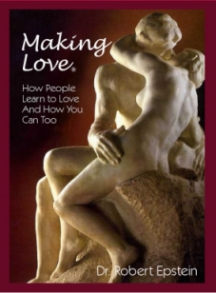 "Making Love® is an exciting "Making Love® is an exciting contribution to relationship building in America. Love and marriage are too pre- cious to be left to chance. Epstein offers a much needed corrective.” —Diane Sollee, MSW, founder & director, Coalition for Marriage, Family and Couples Education
In a 2002 editorial in Psychology Today, distinguished research psychologist Dr. Robert Epstein — then editor-in-chief of the magazine — announced his intention to embark on a daring personal experiment: He and a relative stranger would sign a Love Contract in which they committed themselves to deliberately falling in love with each other with the help of skilled counselors. His "love project" generated more than 200 news stories in more than a dozen countries, as well as requests from more than 1,000 women to sign the Love Contract! Dr. Epstein's assertion that people can be deliberate about creating love certainly struck a nerve. Is he correct? To read "How Science Can Help You Fall in Love," Dr. Epstein's Jan/Feb 2010 cover story in Scientific American Mind, click here. And to read a recent commentary on Dr. Epstein's work on love in the Washington Post, click here. “Dr. Epstein reveals the
“Making Love® is a remarkable and
“Epstein starts with psychology and
“Love doesn’t have to rely on the To get an advanced peek at MAKING LOVE®—a reality TV show Dr. Epstein is developing with a production company in Los Angeles—check out the recent article from Advertising Age here. The show has drawn praise from thought leaders around the country, including Kevin Roberts, Worldwide CEO of Saatchi & Saatchi, one of the world's top advertising firms; click here to read Roberts' article. “Making Love® will have more Dr. Epstein is also currently working on a book on this topic called Making Love: How People Learn to Love, and How You Can Too, based in part on interviews he has been conducting in recent years with couples in loving, successful arranged marriages around the world. To participate in his ongoing study, click here. "Making Love® won’t be just another The Chautaqua Institution (audience of 3,000) ▪ National Inventors Hall of Fame ▪ The Smithsonian Institution ▪ Procter & Gamble ▪ Bayer ▪ Nestlé ▪ Dupont Merck ▪ Respironics ▪ City of Brea (California) ▪ Adhesives Manufacturers Association ▪ Chemical Specialties Manufacturers Association ▪ Army Research Institute ▪ U. S. Army National Training Center ▪ Creative Problem Solving Institute ▪ American Association of Plastic Surgeons ▪ Tenneco ▪ Georgia Power Company ▪ Institute for International Research ▪ Cambridge Institute for Executive Leadership ▪ National Association of Science Writers ▪ American Society of Safety Engineers ▪ TIME ▪ The New York Times ▪ Sports Illustrated ▪ NPR ▪ BBC ▪ Psychology Today ▪ Parenting ▪ Good Housekeeping ▪ USA Today ▪ Boston Globe ▪ New York Post ▪ New York Daily News ▪ National Enquirer ▪ Cosmopolitan ▪ Popular Science ▪ Wired ▪ Advertising Age ▪ New York Sun ▪ Christian Science Monitor ▪ Scientific American Mind ▪ CNBC ▪ Women's Health ▪ Reason ▪ CBS Early Show ▪ Radio Netherlands ▪ Wprost (Poland) ▪ Baltimore Sun ▪ Verdens Gang (Norway) ▪ WHYY (Philadelphia) ▪ Die Zeit (Germany) ▪ Denver Post ▪ Marie Claire ▪ WHDH (Boston) ▪ Sunday Times (London) ▪ London Evening Standard ▪ Sunday Post (Scotland) ▪ Voice of America ▪ National Examiner ▪ Fox News ▪ Swedish National Radio ▪ Cosmogirl ▪ 48 Hours (CBS) ▪ Soap Talk ▪ Observer (London) ▪ The Other Half (NBC) ▪ Sirius Satellite Radio ▪ Elle ▪ Sunday Herald Tribune (Australia) ▪ WABC (New York) ▪ Chicago Sun Times ▪ CNN ▪ Le Nouvel Observateur (France) ▪ Focus (Germany) ▪ Der Spiegel (Germany) ▪ Diario (Italy) ▪ Radio National (Australia) ▪ BBC Radio Scotland ▪ Los Angeles Times ▪ Mail on Sunday (London) ▪ The Daily Mail (London) ▪ Slate.com ▪ New York Daily News ▪ The O'Reilly Factor (Fox) ▪ San Diego Union-Tribune ▪ WROR (New York) ▪ Salon ▪ The Mitch Albom Show (ABC) ▪ The Guardian (London) ▪ Washington Post ▪ Canadian Broadcasting Company ▪ Washington Times ▪ The Morning Show with Mike and Juliet (Fox) ▪ TVO Television (Toronto) ▪ Orlando Sentinel ▪ The Big Idea with Donny Deutsch ▪ Globe and Mail (Toronto) ▪ BBC World Service ▪ BBC Radio Ulster ▪ Text zur Kunst (Germany) ▪ Smart Marriages Annual Meeting (audience of 2,500) ▪ Reader's Digest ▪ Southern Growth Policies Board ▪ Centre for Confidence and Well-Being (Scotland) ▪ University of Strathclyde ▪ International Business School (Isle of Man) ▪ Keio University (Tokyo) ▪ California Western School of Law ▪ Yale University ▪ University of Kyoto (Japan) ▪ Osaka City University (Japan) ▪ Rowland Institute for Science ▪ Marine World (San Francisco) ▪ The Neurosciences Institute ▪ Society for the Scientific Study of Sexuality ▪ The Kinsey Institute ▪ American Psychological Association ▪ Association for Behavior Analysis ▪ Lifetime Television Network ▪ CBS Sunday Morning ▪ National Geographic ▪ l'Actualité (Canada) ▪ Smart Money ▪ Rady School of Management ▪ Max Planck Institute for Human Development ▪ iChannel ▪ Daily Herald ▪ |
|
|
The only cure for tough times is innovation....
Dr. Robert Epstein, Harvard-trained re- searcher and professor and former editor-in-chief of Psychology Today, is one of the world's leading experts on creativity and innovation. The developer of the first formal, empirically-based theory of creative expression—Generativity Theory—Dr. Epstein has shown in laboratory experiments that novel behavior in both animals and people emerges in an orderly and predictable way and that such behavior can be precisely engineered. His techniques for boosting creativity and innovation have been applied at companies worldwide, among them Bayer, Nestlé, and Proctor & Gamble. "We had Dr. Epstein give a multi-day
"The year-long program in Brea, Embedding. Applying the rigorous research findings of Generativity Theory CREATIVITY NEWS: From the cover story of the June/July 2008 Assessment. Most tests of creativity label people as either "creative" or "not cr "Epstein’s talk on creativity and innovation at the Training. Dr. Epstein has also developed dozens of original games and "As a keynote speaker on creativity
"Epstein’s work represents a most Dr. Epstein is available to give lectures on the scientific approach to understanding and boosting creativity and innovation, to provide relevant consulting services, and, on a limited basis, to lead training seminars that teach creativity competencies. Call Laura at 1-206-339-8311 for details, or write to LauraCraig@OutInFrontPublicity.com. The Chautaqua Institution (audience of 3,000) ▪ National Inventors Hall of Fame ▪ The Smithsonian Institution ▪ Procter & Gamble ▪ Bayer ▪ Nestlé ▪ Dupont Merck ▪ Respironics ▪ City of Brea (California) ▪ Adhesives Manufacturers Association ▪ Chemical Specialties Manufacturers Association ▪ Army Research Institute ▪ U. S. Army National Training Center ▪ Creative Problem Solving Institute ▪ American Association of Plastic Surgeons ▪ Tenneco ▪ Georgia Power Company ▪ Institute for International Research ▪ Cambridge Institute for Executive Leadership ▪ National Association of Science Writers ▪ American Society of Safety Engineers ▪ TIME ▪ The New York Times ▪ Sports Illustrated ▪ NPR ▪ BBC ▪ Psychology Today ▪ Parenting ▪ Good Housekeeping ▪ USA Today ▪ Boston Globe ▪ New York Post ▪ New York Daily News ▪ National Enquirer ▪ Cosmopolitan ▪ Popular Science ▪ Wired ▪ Advertising Age ▪ New York Sun ▪ Christian Science Monitor ▪ Scientific American Mind ▪ CNBC ▪ Women's Health ▪ Reason ▪CBS Early Show▪Radio Netherlands▪ Wprost (Poland)▪ Baltimore Sun ▪ Verdens Gang (Norway)▪WHYY (Philadelphia)▪ Die Zeit (Germany)▪ Denver Post ▪ Marie Claire ▪WHDH (Boston)▪ Sunday Times (London)▪ London Evening Standard ▪ Sunday Post (Scotland)▪Voice of America▪ National Examiner ▪Fox News▪Swedish National Radio▪ Cosmogirl ▪48 Hours (CBS)▪Soap Talk▪ Observer (London)▪The Other Half (NBC)▪Sirius Satellite Radio▪ Elle ▪ Sunday Herald Tribune (Australia)▪WABC (New York)▪ Chicago Sun Times ▪CNN▪ Le Nouvel Observateur (France)▪ Focus (Germany)▪ Der Spiegel (Germany)▪ Diario (Italy)▪Radio National (Australia)▪BBC Radio Scotland▪ Los Angeles Times ▪ Mail on Sunday (London)▪ The Daily Mail (London)▪ Slate.com ▪ New York Daily News ▪The O'Reilly Factor (Fox)▪ San Diego Union-Tribune ▪WROR (New York)▪ Salon ▪The Mitch Albom Show (ABC)▪ The Guardian (London)▪ Washington Post ▪Canadian Broadcasting Company▪ Washington Times ▪The Morning Show with Mike and Juliet (Fox)▪TVO Television (Toronto)▪ Orlando Sentinel ▪The Big Idea with Donny Deutsch▪ Globe and Mail (Toronto)▪BBC World Service▪BBC Radio Ulster▪ Text zur Kunst (Germany)▪Smart Marriages Annual Meeting (audience of 2,500)▪ Reader's Digest ▪Southern Growth Policies Board▪Centre for Confidence and Well-Being (Scotland)▪University of Strathclyde▪International Business School (Isle of Man)▪Keio University (Tokyo)▪California Western School of Law▪Yale University▪University of Kyoto (Japan)▪Osaka City University (Japan)▪Rowland Institute for Science▪Marine World (San Francisco)▪The Neurosciences Institute ▪ Society for the Scientific Study of Sexuality ▪ The Kinsey Institute ▪ American Psychological Association ▪ Association for Behavior Analysis ▪ Lifetime Television Network ▪ CBS Sunday Morning ▪ National Geographic ▪ l'Actualité (Canada) ▪ Smart Money ▪ Rady School of Management ▪ Max Planck Institute for Human Development ▪ iChannel ▪ Daily Herald ▪ |
|
|
ARTIFICIAL INTELLIGENCE As the co-creator and former director of the annual Loebner Prize Competition in Artificial Intelligence (first held in 1991), Dr. Epstein brought together some of the most eminent thinkers in the world—W. V. Quine, I. Bernard Cohen, Ray Kurzweil, Daniel Dennett, Joseph Weizenbaum, Oliver Selfridge, Allen Newell, and others—to design and oversee a contest to find the world's first "thinking" computer, along the lines suggested by computer pioneer Alan Turing in 1950. With Gary Roberts and Grace Beber, Dr. Epstein has recently edited a comprehensive volume called Parsing the Turing Test: Philosophical and Methodical Issues in the Quest for the Thinking Computer, which reviews the status of Turing's provocative predictions. "PARSING THE TURING TEST is a landmark exploration of both the philosophical and methodological issues surrounding the search for true artificial intelligence. Will computers and robots ever think and communicate the way humans do? When a computer crosses the threshold into self-consciousness, will it immediately jump into the Internet and create a World Mind? Will intelligent computers someday recognize the rather doubtful intelligence of human beings? Distinguished psychologists, computer scientists, philosophers, and programmers from around the world debate these weighty issues – and, in effect, the future of the human race – in this important volume."
For a related video clip, which has had more than 2.5 million views on YouTube, click here. To read Dr. Epstein's latest article on this topic, "From Russia, with Love: How I Got Fooled (and Somewhat Humiliated) by a Computer," click here. Also of possible interest, Dr. Epstein's embarrassing interview on NPR's "Radiolab" about the Russia incident. Click here for that. Dr. Epstein is available to give talks on this topic. |
|




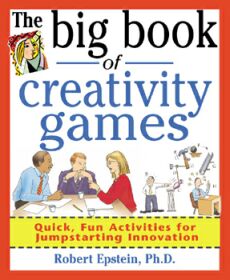
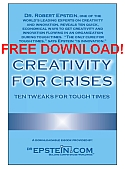
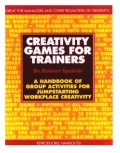
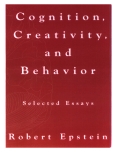
 A "mini" ECCI-i test (which does not give separate competency scores) can be taken by clicking
A "mini" ECCI-i test (which does not give separate competency scores) can be taken by clicking 